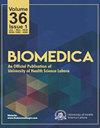De Quervain’s tenosynovitis and thumb pain in physiotherapists practicing manual therapy: prevalence and associated factors
IF 0.6
4区 医学
Q4 TROPICAL MEDICINE
引用次数: 0
Abstract
Background and Objective: Manual therapy is a treatment approach by physical therapists where different techniques are applied to patients with hands for rehabilitation purposes. The objective of the study was to find the frequency of De’Quervain tenosynovitis and thumb and wrist pain in physical therapists working in different rehabilitation centers in relation to age, body mass index (BMI), and working hours. Methods: A cross-sectional study was conducted on 135 physical therapists working in different settings in Lahore, Pakistan. Physiotherapists were enrolled by convenience sampling. Data were recorded on a questionnaire form. Finkelstein test was performed to check De Quervain’s tenosynovitis. A numeric pain rating scale was sued to measure pain. The data were tested for significance using statistical tests. Results: On the dominant hand, 99 (73.3%) physical therapists had no wrist pain, 104 (77%) had no thumb pain, 28 (20.7%) had mild wrist pain and 20 (14.8%) had mild thumb pain. Only 21 (15.6%) physiotherapists were tested positive for Finkelstein (De Quervain’s tenosynovitis). Finkelstein test reported 100% negative result on the non-dominant side. There is a negative correlation between thumb pain with the age (r = -0.005), BMI (r = -0.110) and working hours (r = -0.033) of the physical therapists. Conclusion: The study concluded that the prevalence of De Quervain’s tenosynovitis, thumb, and wrist pain was more on the dominant hand than on the non-dominant side. The majority of the physical therapists reported mild to no pain in the wrist and thumb. There is a negative correlation of thumb pain with age, BMI and working hours.De Quervain的腱鞘炎和拇指疼痛的物理治疗师进行手工治疗:患病率和相关因素
背景和目的:手工疗法是一种由物理治疗师应用不同技术对手部患者进行康复的治疗方法。本研究的目的是发现在不同康复中心工作的物理治疗师患De 'Quervain腱鞘炎、拇指和手腕疼痛的频率与年龄、体重指数(BMI)和工作时间的关系。方法:对在巴基斯坦拉合尔不同环境工作的135名物理治疗师进行了横断面研究。采用方便抽样的方法纳入物理治疗师。数据以问卷形式记录。采用Finkelstein试验检查De Quervain氏腱鞘炎。使用数字疼痛评定量表来测量疼痛。采用统计学检验对数据进行显著性检验。结果:优势手无腕痛99人(73.3%),无拇指痛104人(77%),轻度腕痛28人(20.7%),轻度拇指痛20人(14.8%)。仅有21名(15.6%)物理治疗师Finkelstein (De Quervain’s腱鞘炎)检测呈阳性。芬克尔斯坦试验报告非显性侧100%阴性。拇指疼痛与物理治疗师的年龄(r = -0.005)、BMI (r = -0.110)、工作时间(r = -0.033)呈负相关。结论:本研究认为,De Quervain肌腱滑膜炎、拇指和腕关节疼痛的患病率在优势侧多于非优势侧。大多数物理治疗师报告手腕和拇指的疼痛轻微至无痛。拇指疼痛与年龄、BMI、工作时间呈负相关。
本文章由计算机程序翻译,如有差异,请以英文原文为准。
求助全文
约1分钟内获得全文
求助全文
来源期刊

Biomedica
医学-热带医学
CiteScore
1.60
自引率
0.00%
发文量
76
审稿时长
>12 weeks
期刊介绍:
Biomédica is the quarterly journal of the Instituto Nacional de Salud of Colombia [Colombias National Health Institute]. Its purpose is to publish the results of original research that contributes meaningfully to knowledge in health and biomedical sciences.
 求助内容:
求助内容: 应助结果提醒方式:
应助结果提醒方式:


